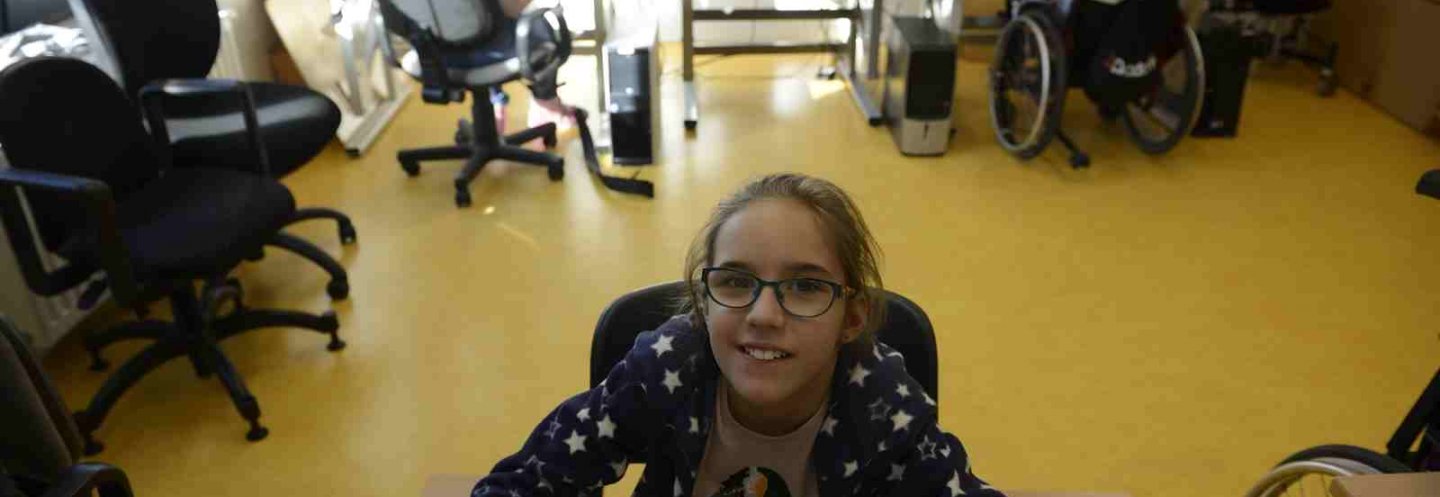
Study the possible
Study the possible involvement of people with disabilities (2017-1-HU01-KA104-035702)
Increasing international demands that the advocacy and service provider organizations involve their main beneficiaries into the leadership of the institution. The Hand in Hand Foundation aim is to promote the human right of the persons living with disability by involving them into its leadership. Within the framework of the project, our staff memebrs and an expert by experience person who has been working with us for some time study and learn the regarding practice of the Finnish KVPS organization within 3 five days study visit . Each organizational unit involved, so all the professional and operational leadership and professional working groups (methodological, occupational, opinion-forming) members can verify the good practice of stakeholders around a different aspect. The good practice will be built into the operational work within a structured framework. We will analyze, adapt and build into our daily practice the suitable and adaptable elements of the best practice. The primary impact of the project is the developing organizational culture of the Foundation. In addition directly reflected in the quality of life of those involved in the development and who can work with us in shaping the organizational profile. Social impacts among people with disabilities to appear in a new role and strengthening inclusion.
We will pass on our experience and developing perating practices to other organizations and to introduce a number of other projects.
During the study visit to Finland we examined the involvement of people with disabilities in certain activities of the organization. For me, as a project leader, it was important to see how they can be involved in the development processes of the different activities of the organization, what kind of tasks can be assigned to them and how they can be part of decision making. During the visit, we became acquainted with several organizations that cooperate with our host, KVPS (Kehitysvammaisten Palvelusäätiö). This foundation is one of the largest providers of social services in Finland. The process of deinstitutionalisation is taking place in the country in the current years, and KVPS plays a very important role in it. A significant part of the gambling revenue in Finland is given to the foundation, which then buys housing for people with disabilities in which they can live independently. The flats/apartments are selected jointly by the people with disabilities, taking into account their needs and preferences, and also ensuring so that the housing can be sustainable from the income of those who live in it. KVPS is the owner of the apartments and the people with disabilities living in it are the tenants who pay the rent. Those who cannot live on their own due to their condition are living in smaller, community-based homes that are owned either by a civil organization or by the local government. Although people living in homes need more support, thanks to the person-centered approach they also take part in decision-making in questions related to their lives. During a visit to one of these homes, we learnt from the staff that the testing and the daily use of the curricula of the STEPS project, which was implemented in a strategic partnership with us as an Erasmus + project in the previous years, has brought some changes in the operation of the home. Using the tools and methods described in the STEPS project, the staff recognized that the people with disabilities have skills and abilities that they had not recognized previously and started to involve them more actively in different activities. Another important experience was the meeting with Auli Leiniö. Auli is a person with disabilities living in a supported living home and working at KVPS for 4 days a month. He works there as a project assistant, and he is responsible for recording, processing and summarising the results of the evaluation forms related to the different trainings held at the organisation. The Finnish rules determine how much people with disabilities are allowed to earn monthly so that they remain still entitled to the cash benefits they receive from the state or from their local government. These benefits fundamentally cover their living costs and needs, so the number of people on the open labour market is not high. Auli found out for himself that he wanted to work at KVPS. A few years ago he travelled to Austria through an Erasmus + project of KVPS, where he met several people with disabilities who had administrative jobs, and he also felt like doing it. He wrote a letter to the KVPS staff describing his wish to work at the organization, and after overcoming several administrative barriers, eventually he was hired. It was inspirational to see his spiritedness and steadfastness, and it was a special experience that, although indirectly, this was due to an EU project. During the study trip, one of the most important experiences was that small steps could be taken to involve people with disabilities in getting acquainted with the different work processes, to give space to their opinions, and to base some development processes on their experiences.
Studying the involvement of people with disabilities in the management of the organization
Summary report of the 1st study tour
Practice and impact of involving people with disabilities in the operations of the organization at the operational and management level, as well as in external communication and public opinion-forming activities.
Name of participant: Ákos Pordán, managing director
Host organization name: KVPS, Wärjäämö, ASPA
Location of the Study Tour: Tampere, Helsinki (Finland)
Date: 25-30 March 2018
During the study trip meetings in connection with the involvement of people with disabilities in management activities were: KVPS management, Wärjäämö day-care institution, Metse's self-advocacy organization.
We have seen different ways of selecting people with disabilities. At KVPS the persons involved in the management are not service users of the organisation. Their involvement did not go from one day to the next. It took nearly 10 years to succeed in choosing the skilled persons with mental disabilities who could accomplish this task and to secure the safe environment for them. At Wärjäämö (offering direct services to service users) people with disabilities are selected from their own service users and they operate the services in a democratic way. Here, the selection goes faster, and the involved persons may change as well. We also met an independent legal entity, a self-advocacy organization (METSE) whose members are people with disability. In over 20 years they managed to gather 1000 members.
The inclusive activities are also different at each organization. Wärjäämö: at the service level meetings are held on a regular basis that are led by persons with disabilities in a formalized way, involving officials. KVPS: the management meets every two months and they invite also a board member with disability. METSE: meetings are held on a monthly basis. The selection procedure is different at the different levels: service level, management level, or at the self-advocacy organization.
Persons with disabilities receive continuous professional training and support tailored to their abilities in the form of easy-to-understand materials and personal advice. In carrying out the activity, people with disabilities receive the necessary professional and administrative assistance at all levels necessary to perform the activity. They get reimbursement in connection with their work, but they don't get a salary. Moral and friendly appreciation means motivation for them.
The exchange of people with disabilities involved in activities is different at the different organizations:
Wärjäämö: There are minor changes at the service level, but in case of more important positions, like the person of the president has not changed for a long time. If a new client arrives or an old one goes away, this can make a change.
KVPS: The person with disability involved in the management was selected 10 years ago, he has a stable position, it does not change.
METSE: They work with a roughly stable membership, no major changes.
There are no major difficulties with the involvement of people with disabilities nowdays. This process has been going on for more than 20 years, so the system is now running smoothly with the right mechanisms.
In Finland the involvement of persons with disabilities at different levels of the organisations started in the 1990s following Swedish and English examples. Finland has deep democratic engagement and experience both in the school system and at the workplaces, so it has been relatively easy to introduce these mechanisms and to involve people with disabilities.
The greatest successes were observed in the following areas:
By involving people with disabilities, services and institutions are more likely to take into account the needs and opinions of the clients. Institutional mechanisms have been introduced to involve people with disabilities, which significantly increased the service users' satisfaction. Overall, the quality of services has increased considerably.
Regarding our subject all of the above practices are good and to be followed: from the organizational management point of view KVPS, involving persons with disabilities into the work of the board of trustees, on the service level the practice of Wärjäämö, involving clients in the management of their own destiny, and in the case of METSE, the organized and supported operation of the self-advocats.
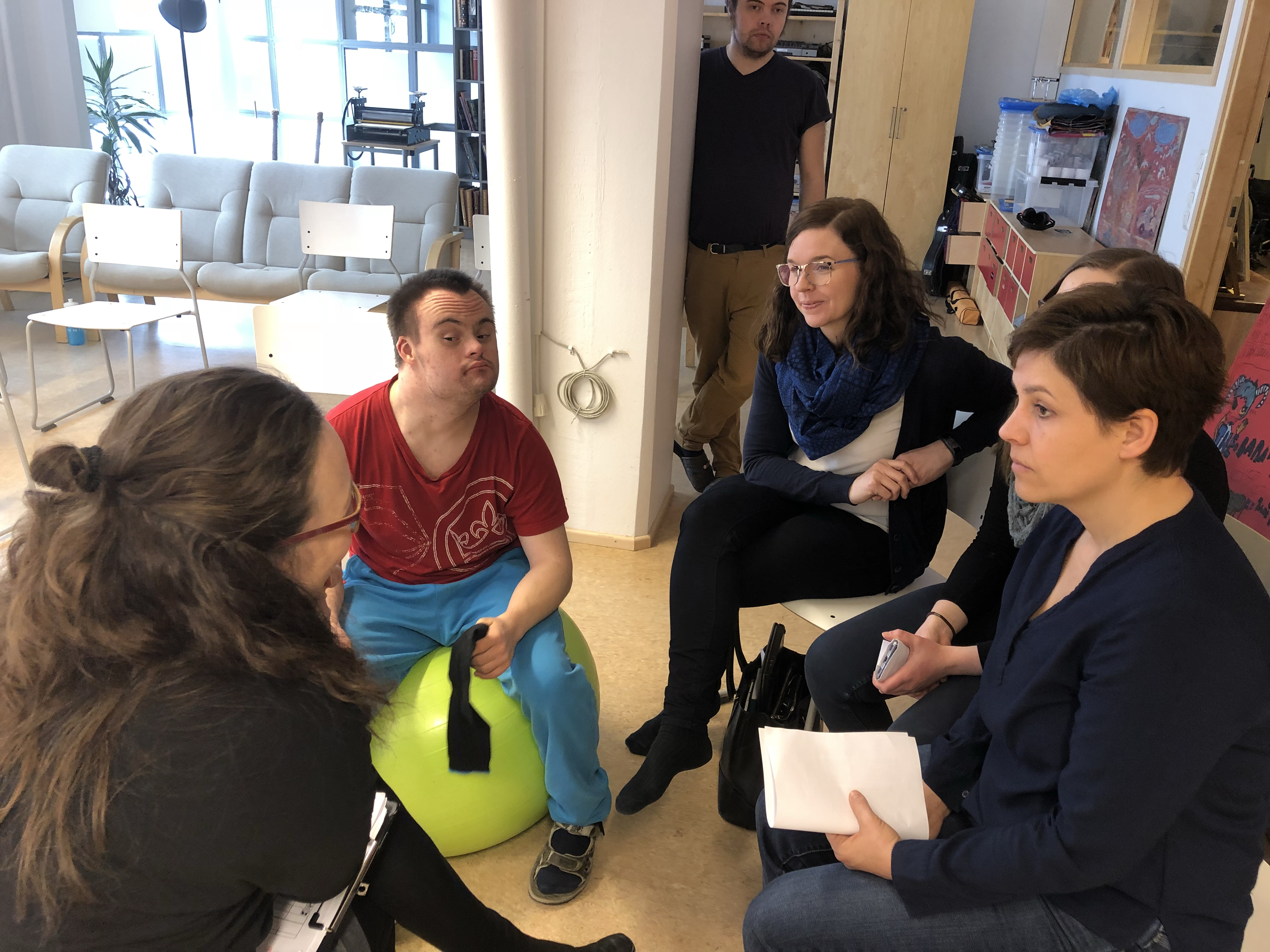
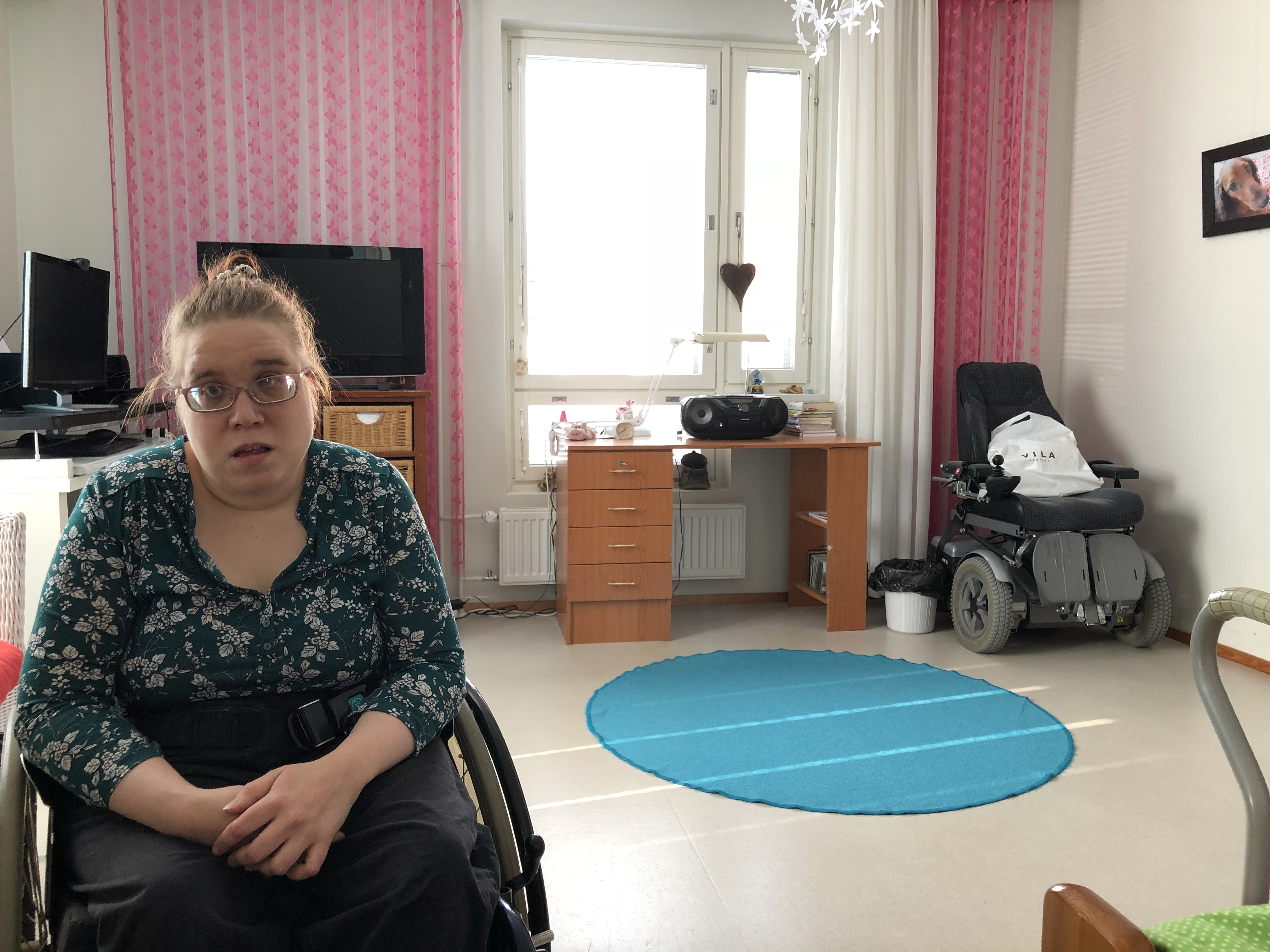
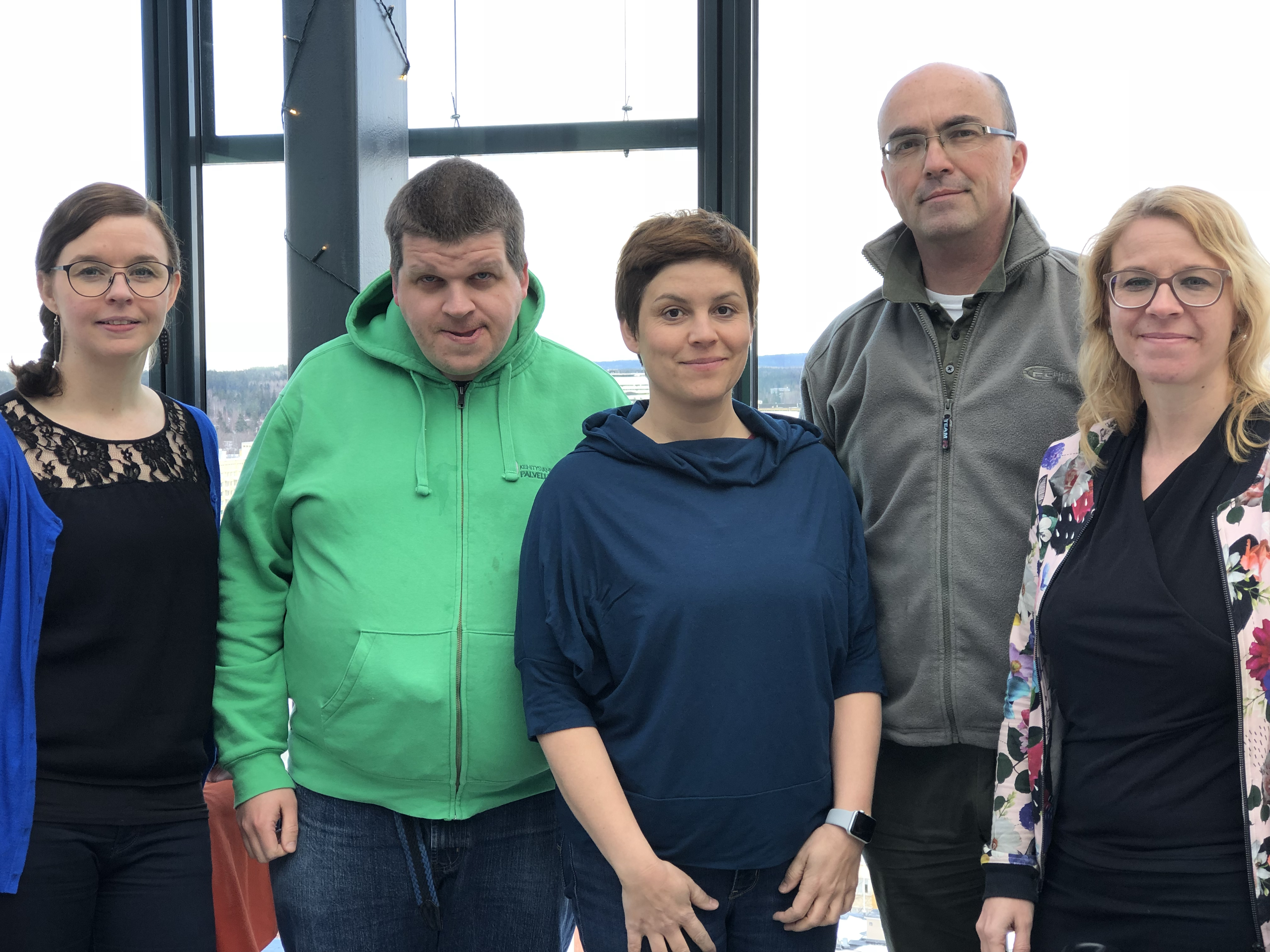
Studying the involvement of people with disabilities in the management of the organization
Summary report of the 1st study tour
Practice and impact of involving people with disabilities in the operations of the organization at the operational and management level, as well as in external communication and public opinion-forming activities.
Name of participant: Éva Kovács, Head of methodological department
Host organization name: KVPS, Wärjäämö, ASPA
Location of the Study Tour: Tampere, Helsinki (Finland)
Date: 25-30 March 2018
Examined area: Kehitysvammaisten Palvelusäätiö (KVPS)
Name of hosts: Katri Hanninan, Kirsi Konola
The involvement of people with disabilities started in 2008. At the beginning they decided that people with different support needs shall be involved (the organisation provides services only to people with intellectual disabilities).
The following considerations were taken into account during the selection process:
- representing a typical group / need
- having some special interest
- being geographically accessible and the journey involved shouldn’t cause him/her a disproportionate burden
- gender is represented in roughly equal proportions.
It is important that they work well together, and that there is no conflict between the members.
The involvement of the persons depends on the organizational activities of the given period, the undertakings and the interests of the persons. On one hand, they act as a project team and on the other hand as a kind of advisory body to the organization. As the members are KVPS users, they can also give feedback on a variety of operational issues.
The staff members of the organization also invite them to consultations and to be experts (depending on the area and activity), thus they also serve an advisory role.
The 10 people who form the advisory body have been gradually found and involved. Today, this is a stable team, no new members are planned to be taken.
The activity of the organization was well-known to everyone involved because they are also service users. Thus they need support rather than preparation when doing their tasks.
So they receive support in their work. There is a facilitator to help organizing things, scheduling appointments, taking notes etc. It is evident that they receive the documents related to the consulting cases they are involved in in an easy-to-understand format. The persons with disabilities involved in the activities of the organisation do not receive any salary. The prestige associated with the task and the occupation seems to be a motivational tool for them.
An annual plan is prepared that includes those plans, programs, projects that the persons with disabilities want to participate in and those that they want to implement themselves. They are supported in the planning and implementation by the facilitator or by the specialist in the organization. The facilitator takes part in the work of the group besides his/her other duties, and therefore it requires organization and reorganization from his/her side.
The persons with disabilities take part in the different projects according to their own interests. Many of them write blogs, others organize groups or leisure activities in the local community. They participate in events, campaigns, give interviews, write articles, speak up in events if they need to. They also work in international programs. In addition to their own projects, they primarily comment on the organization's annual operational plans, participate in meetings and planning sessions.
The persons with disabilities actively participate in the life of the organization, they have a noticeable impact.
We did not see any difficulty with the involvement of persons with disabilities. It is natural that people with disabilities need more support in some things, and in those things they receive help from the staff.
At KVPS, it is part of the organizational culture is that they pay attention to each other and to the needs of others, and this suits well also to working with people with disabilities. The supportive attitude of the staff is important, so the involvement of persons with disabilities in a more hierarchical, patriarchal system would be unthinkable.
The organization needs to work in a way that takes into account the needs and opinions of the persons with disabilities. KVPS has prepared lot of material about how persons with disabilities can participate better and easier in shaping their own lives. These are short, targeted publications.
During their joint work, there have been many good stories, many new relationships have been established and a good work culture has developed. Many projects have also been implemented as a result of the joint work, which specifically addresses the creation of a more effective social participation of persons with disabilities.
In many cases, naturally, the parents stand also in the background. The organization itself considers the value of "parents are the voices of people with disabilities" important, but in Finland, people with disabilities live with stronger self-determination, which can be greatly strengthened by the responsible tasks they undertake in their work.
The involvement of persons with disabilities as a whole is a good practice. The voice of persons with disabilities is displayed at the management level, in the operation and in the individual projects. They have been clearly integrated into the organization over the last 10 years.
The Inclusive Research Methodology: different themes are being elaborated with this method, they ask for the opinion of persons with disabilities using the method and then make the results easy to understand. Topics covered so far: aging and the needs of aging persons, work, adulthood. Workshops involving persons with disabilities are held to elaborate the themes, the questions are formed on the basis of these workshops, and then during the interview, a facilitator helps answering the questions and recording the answers, but basically the interviewee and the interviewer are also persons with disabilities.
Other good practices we have seen:
Me ytse - the advocacy organization of people with intellectual disabilities in Finland. The organization is led by persons with disabilities, it employs 25 people and its work is helped by a number of volunteers and trainees.
Mission: training and teaching people with intellectual disabilities in order to speak up for their interests.
Main principles: respect for personal dignity, advocacy and freedom of choice, full recognition of personal experiences, teamwork and cooperation. The representative body consists of 4 people who have financial responsibility, and the decision-making council consists of 8 people with intellectual disabilities. They decide on the direction in which the organization is going and what activities it takes, and what activities it initiates. On strategic matters, they decide in the annual meetings together with the members. Currently they have 35 local groups, and they are growing steadily. They regularly collaborate with Inclusion Finland (KVPS's founding organization, a parent organization) and with KVPS. https://www.tukiliitto.fi/toiminta/me-itse-ry/
The experiences of a person with disabilities involved in the work of the organization:
Examined area: Advisory body (KVPS)
The person with disabilities involved in area: Krisse Pääskynen - http://www.kvps.fi/blogit/meidan-blogi/yhdessa-oloa-ja-vaikuttamista
Krisse has been working in the group for 10 years, he usually works 1-5 days a month.
He is motivated to participate in the organization's work to enforce his interests and to be able to influence the widest range of areas to promote the social inclusion of people with disabilities.
In his work he considers the opportunity to develop international relations and to be able to participate in international projects as his biggest personal success. He is involved in more than one field of work, he is involved in the work of Me ytse, and also in the work of local groups.
He is satisfied with the activities he does at the organisations and he was very interested in the situation of Hungary. It is natural for him to cooperate and to work together with others in advocacy activities.
In his work, travel is the greatest difficulty he needs to face. At the same time, he loves to travel, and after his daily programs at work he goes shopping, has a coffee somewhere and looks around in the town. He receives travel reimbursement in connection with his work related travels and a daily allowance for his activities as an expert.
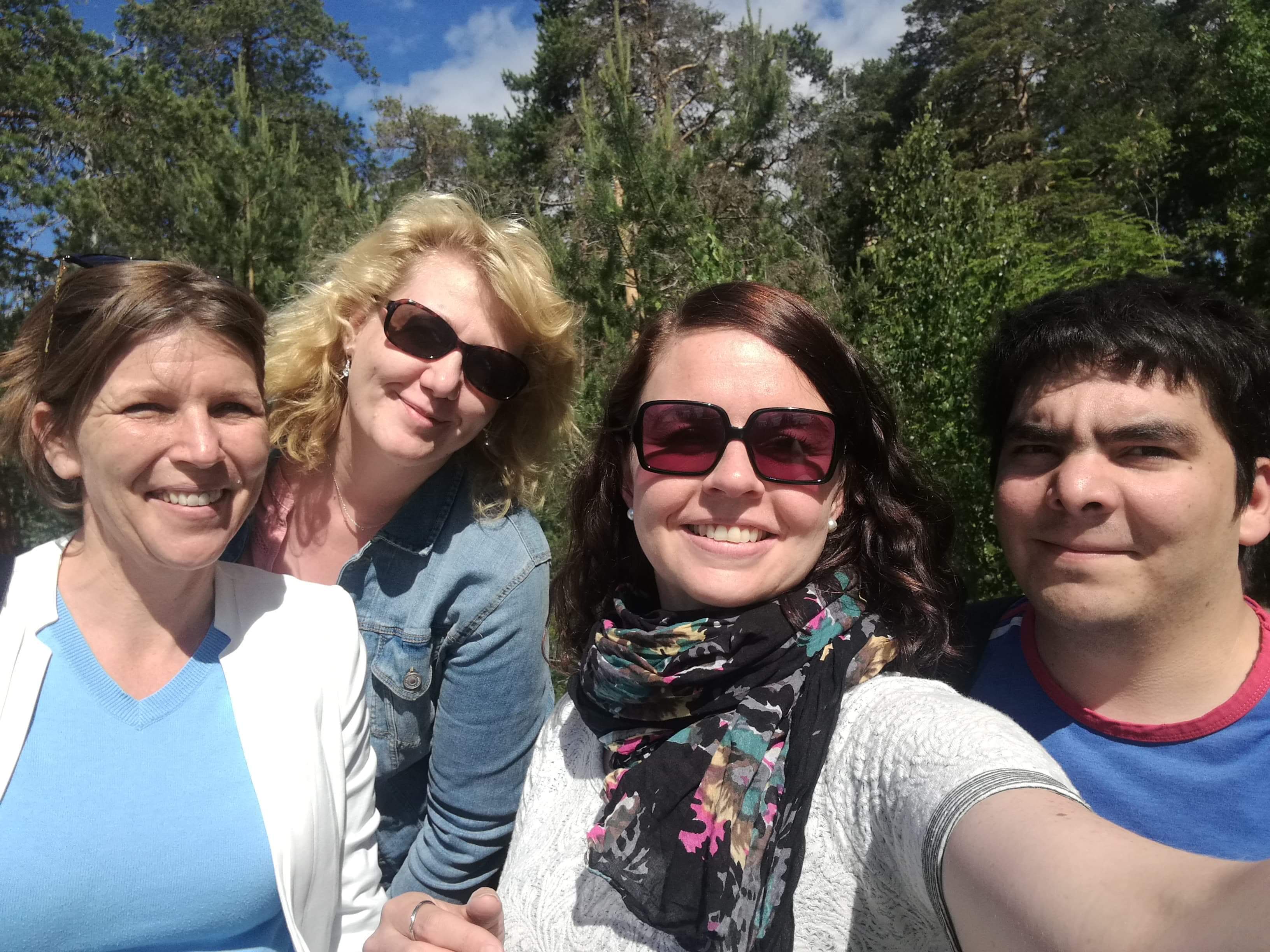
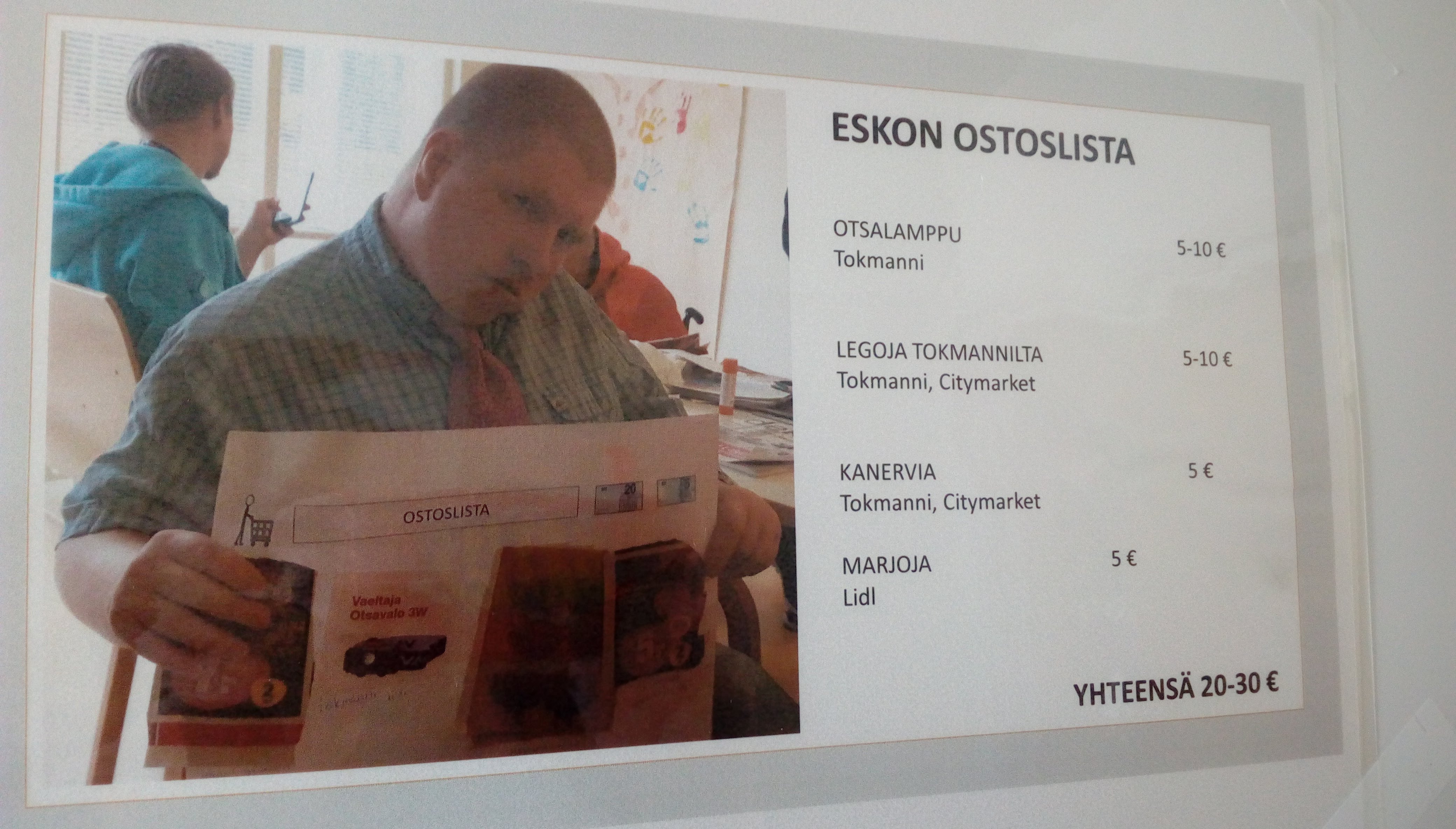
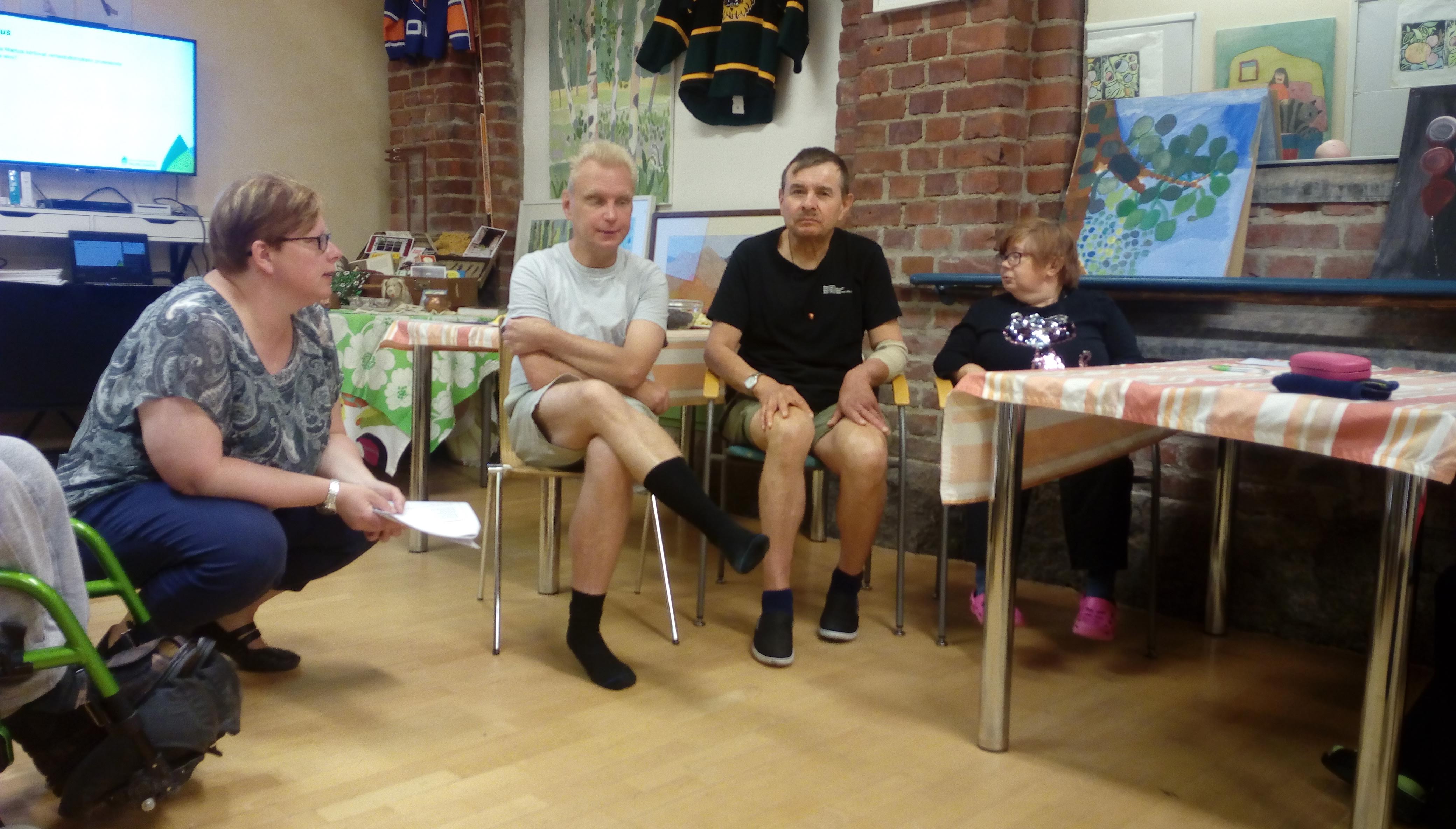
Studying the involvement of people with disabilities in the management of the organization
Summary report of the 2nd study tour
Name of participant: Zsuzsa Rozgonyi, program manager
Host organization name: KVPS
Location of the Study Tour: Tampere (Finland)
Date: 10-16 June 2018
During the study visit to Finland we examined the involvement of people with disabilities in certain activities of the organization. For me, as a project leader, it was important to see how they can be involved in the development processes of the different activities of the organization, what kind of tasks can be assigned to them and how they can be part of decision making. During the visit, we became acquainted with several organizations that cooperate with our host, KVPS (Kehitysvammaisten Palvelusäätiö). This foundation is one of the largest providers of social services in Finland. The process of deinstitutionalisation is taking place in the country in the current years, and KVPS plays a very important role in it. A significant part of the gambling revenue in Finland is given to the foundation, which then buys housing for people with disabilities in which they can live independently. The flats/apartments are selected jointly by the people with disabilities, taking into account their needs and preferences, and also ensuring so that the housing can be sustainable from the income of those who live in it. KVPS is the owner of the apartments and the people with disabilities living in it are the tenants who pay the rent. Those who cannot live on their own due to their condition are living in smaller, community-based homes that are owned either by a civil organization or by the local government. Although people living in homes need more support, thanks to the person-centered approach they also take part in decision-making in questions related to their lives. During a visit to one of these homes, we learnt from the staff that the testing and the daily use of the curricula of the STEPS project, which was implemented in a strategic partnership with us as an Erasmus + project in the previous years, has brought some changes in the operation of the home. Using the tools and methods described in the STEPS project, the staff recognized that the people with disabilities have skills and abilities that they had not recognized previously and started to involve them more actively in different activities. Another important experience was the meeting with Auli Leiniö. Auli is a person with disabilities living in a supported living home and working at KVPS for 4 days a month. He works there as a project assistant, and he is responsible for recording, processing and summarising the results of the evaluation forms related to the different trainings held at the organisation. The Finnish rules determine how much people with disabilities are allowed to earn monthly so that they remain still entitled to the cash benefits they receive from the state or from their local government. These benefits fundamentally cover their living costs and needs, so the number of people on the open labour market is not high. Auli found out for himself that he wanted to work at KVPS. A few years ago he travelled to Austria through an Erasmus + project of KVPS, where he met several people with disabilities who had administrative jobs, and he also felt like doing it. He wrote a letter to the KVPS staff describing his wish to work at the organization, and after overcoming several administrative barriers, eventually he was hired. It was inspirational to see his spiritedness and steadfastness, and it was a special experience that, although indirectly, this was due to an EU project. During the study trip, one of the most important experiences was that small steps could be taken to involve people with disabilities in getting acquainted with the different work processes, to give space to their opinions, and to base some development processes on their experiences.
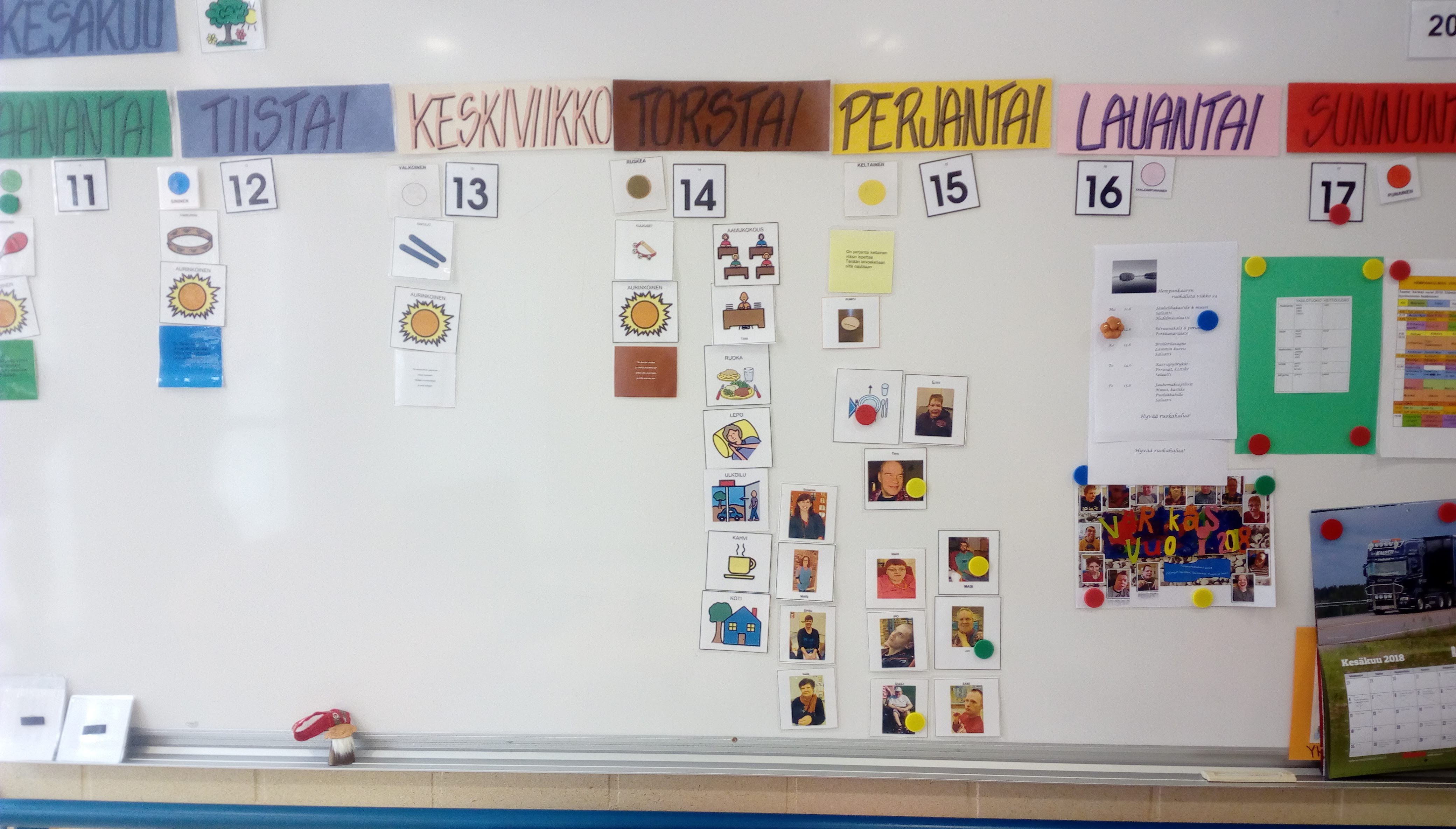
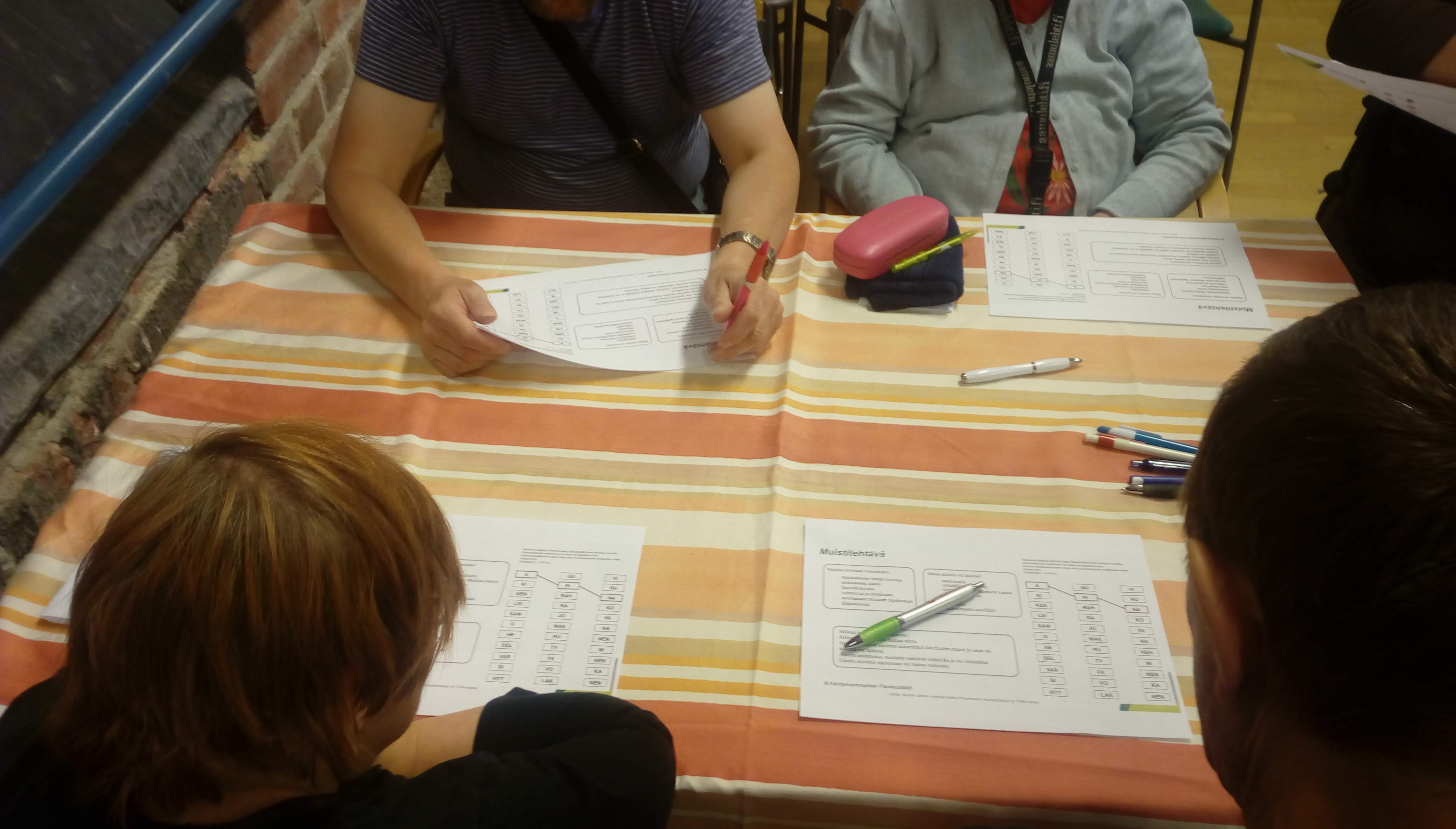
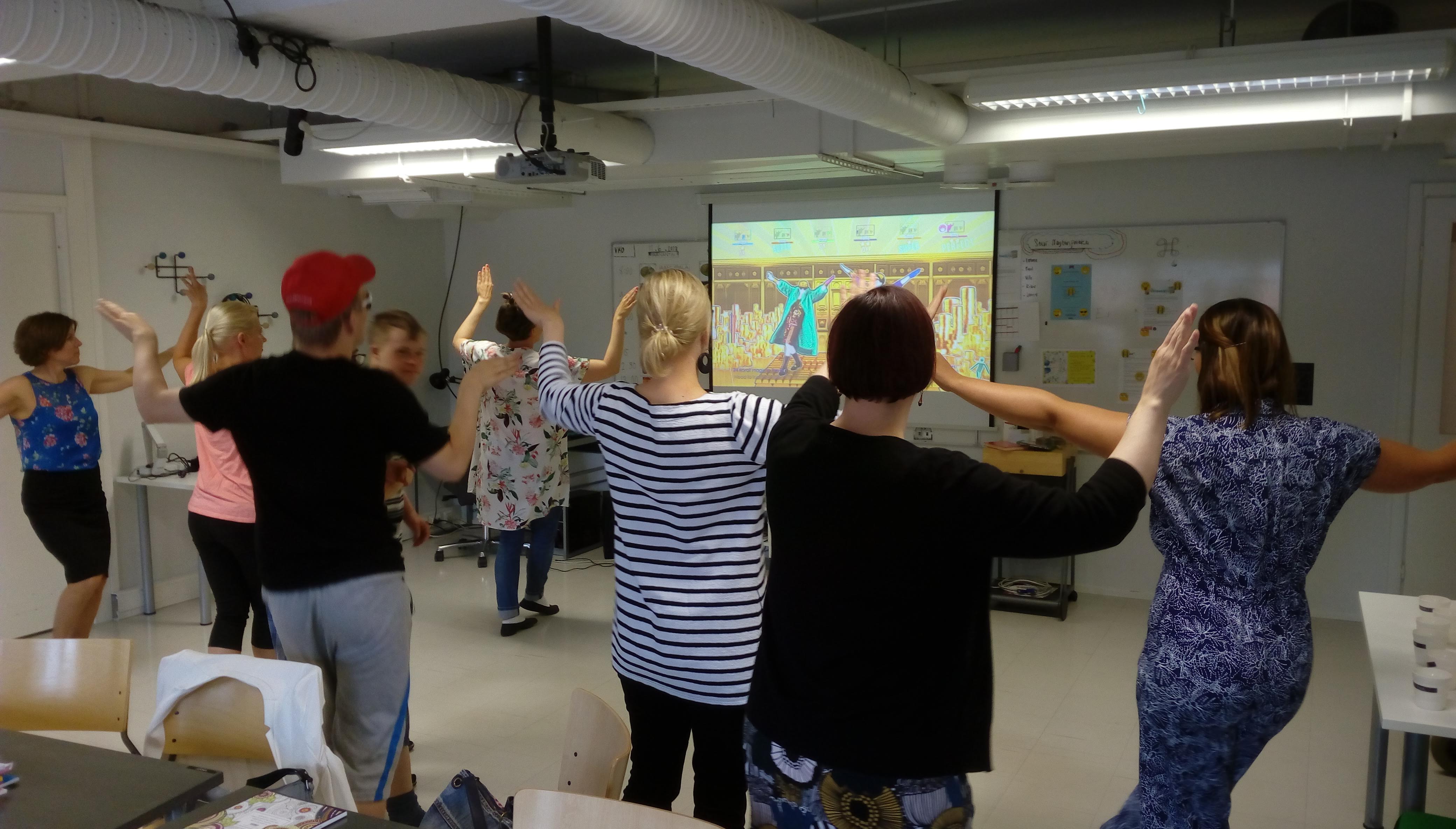
Studying the involvement of people with disabilities in the management of the organization
Summary report of the 2nd study tour
Name of participant: Adrienn Gazsi Dr., lawyer, head of the legal aid service of Hand in Hand Foundation
Host organization name: KVPS
Location of the Study Tour: Tampere (Finland)
Date: 10-16 June 2018
The experience gained about the involvement of people with disabilities
The organizations visited, the legal background associated with the involvement of people with disabilities, focal points, good practices
Name of the Host Party (Presentations, Program):
1. Kehitysvammaisten Palvelusäätiö (KVPS): colleagues (chairman, executive, expert by experience) (How are self-advocates involved? - Katri Hänninen; How can I influence? - Auli Leiniö)
2. Aspa (Presentation of programs, presentations)
3. Tukena Vuores (Residential home – head of the residential home, social care workers)
4. Inclusion Finland, Tulppaanitalo, (Jutta Keski-Korhonen)
5. Nokia – day-care centre (https://www.nokiankaupunki.fi/sosiaali-ja-terveyspalvelut/vammaispalvelut/; Workshop for the elderly with intellectual disability)
6. NEO-OmaPolku (day-care centre)
The implementation of the UN Convention on the Rights of Persons with Disabilities and the EU Disability Strategy at national level and in the operations of the organization. Learning about the Finnish legislation regarding the rights of people with disabilities and the regulations of the organization.
The organizations visited during the study tour, focusing on the selection process to involve people with disabilities in the activities of the organizations.
Remarkable good practices:
- Kehitysvammaisten Palvelusäätiö (KVPS): the strategic goal of the organization is to involve people with disabilities in the decision-making process. Selection: the person applies for a job (See the presentation of Auli Leiniö - How Can I Influence?). Parents of persons with disabilities are currently involved in the organization's board of trustees, and employees with disabilities work on the same basis as other employees.
KVSP promotes awareness of the capabilities and contributions of persons with disabilities.
Good practice: The transparency of the recognition of the expertise, merit, skills and contributions of the employees with disability.
KVSP’s services:
Persons with disabilities have access to a range of in-home, residential and other community support services, including personal assistance necessary to support living and inclusion in the community, and to prevent isolation or segregation from the community.
We have seen very good examples (elements and model projects) of recognizing the diversity of persons with disabilities, providing real needs-based services, having person centered planning (such as having personal budgets, disability card with QR codes, health care financing reform, recognition of property rights of the tenants in the housing services), that might be reasonable to be implemented also in Hungary.
- Tukena Vuores (residential home): Persons with disabilities are involved in the classical self-advocacy forums of the social service system (residential meetings).
They have developed a practice in which people with disabilities are actively involved in decision-making processes about programs, including those directly concerning them.
- Inclusion Finland: The inclusion of people with disabilities through their family members and their professional supporters. In Finland, in the development and implementation of legislation and policies to implement the Convention, and in other decision-making processes concerning issues relating to persons with disabilities, persons with disabilities are actively involved directly or through their representative organizations.
Voting is accessible to people with disabilities and they can exercise their political rights, which guarantees the free expression of the will of persons with disabilities as electors.
- NEO-OmaPolku (day-care centre) provides people with disabilities the possibility of inclusive programs, employment opportunities that support their individual autonomy and independence, including the freedom to make their own choices. The organization places great emphasis on the fact that people with disabilities develop their talents on an equal footing with others (e.g. in art) and that people with disabilities can have access to the new achievements in information and in communication technologies.
- ASPA: Attempts to actively reach and inform people with disabilities to reduce the risk of becoming victims of abuse, neglect or negligent treatment, maltreatment or exploitation both within and outside the home (in residential homes), emphasizing sexual education.
There are programs to combat stereotypes, prejudices relating to persons with disabilities, including those based on sex and age.
- Nokia (day-care centre): It is a relatively segregated form of employment, but with open labor market elements. All employees are people with disabilities or with reduced working capacity.
The general experience is that there are forward-thinking policies and organizational practices based on the CRPD principles and provisions:
- The CRPD principles apply to the implementation and evaluation of the organizations' plans and programs.
- They strive to ensure that persons with disabilities can exercise their rights fully without discrimination.
- The action plans related to persons with disabilities and the general principles on equal opportunities for people with disabilities are gaining momentum in national, regional and international policies.
- Naturally, in Finland, despite the progressive legislation and commitments, people with disabilities still face barriers to their equal participation in society, the organizations still need to make a lot of effort to eliminate them (e.g. making the facilities accessible and the materials easy to understand).
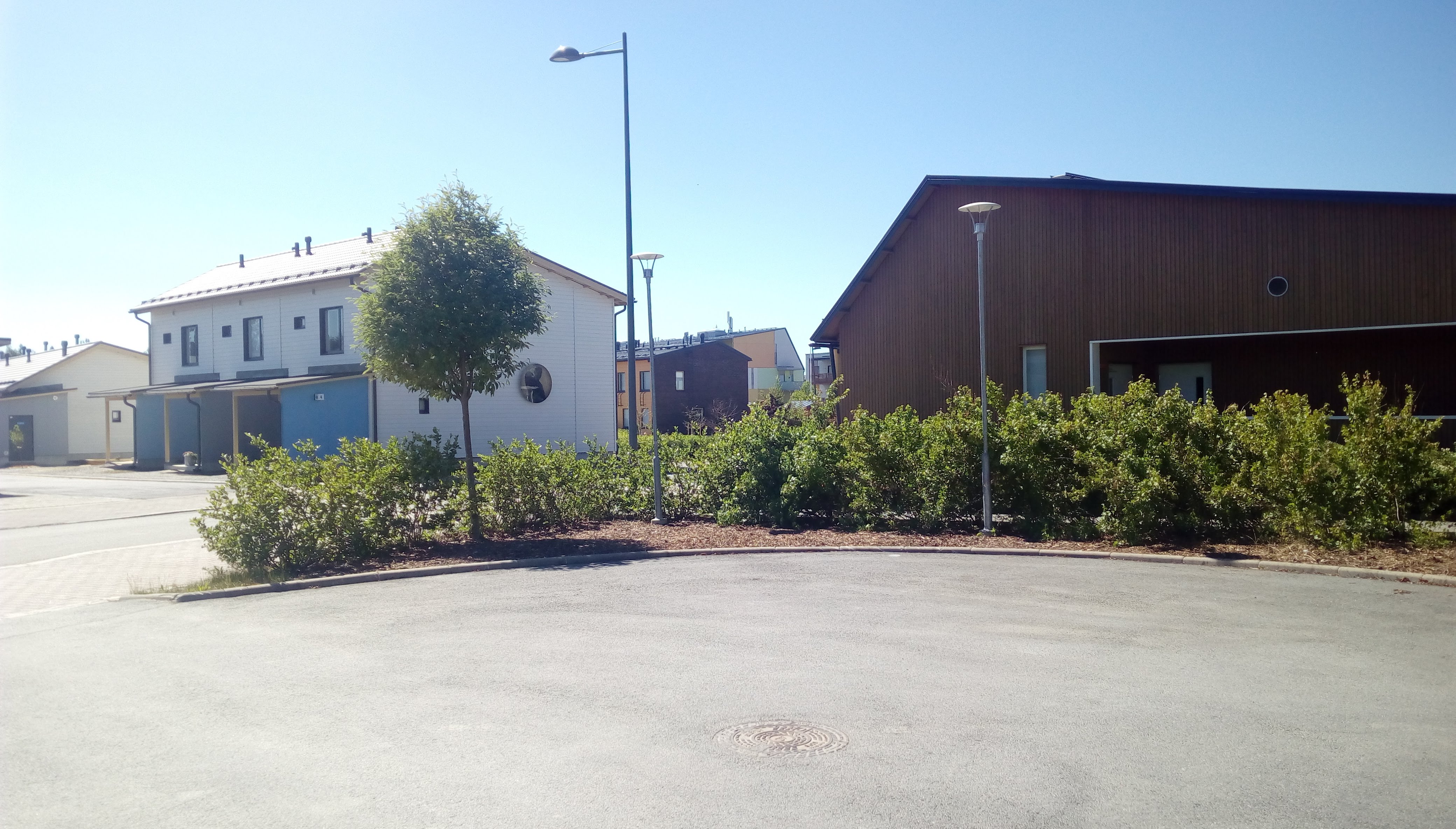
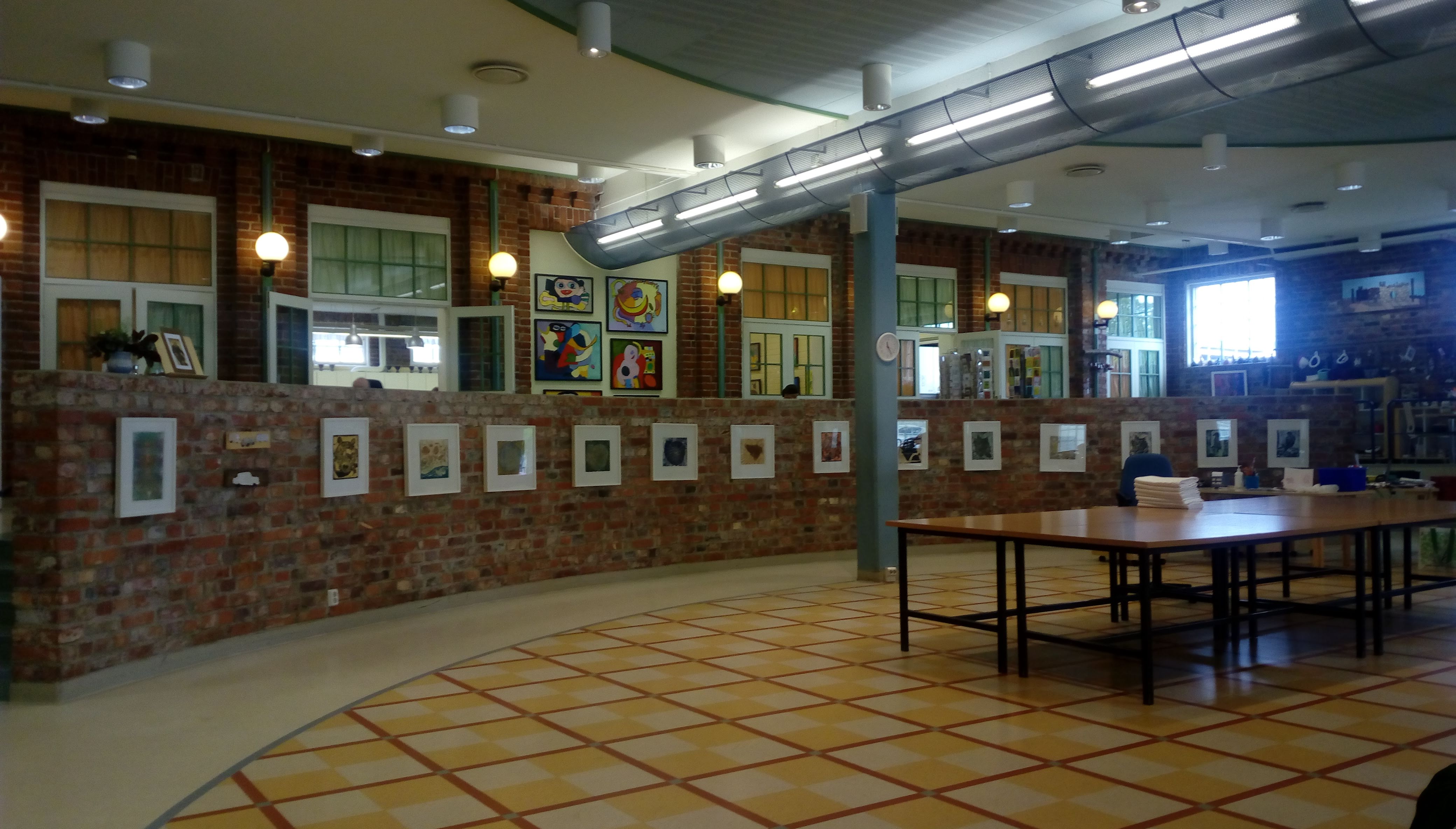
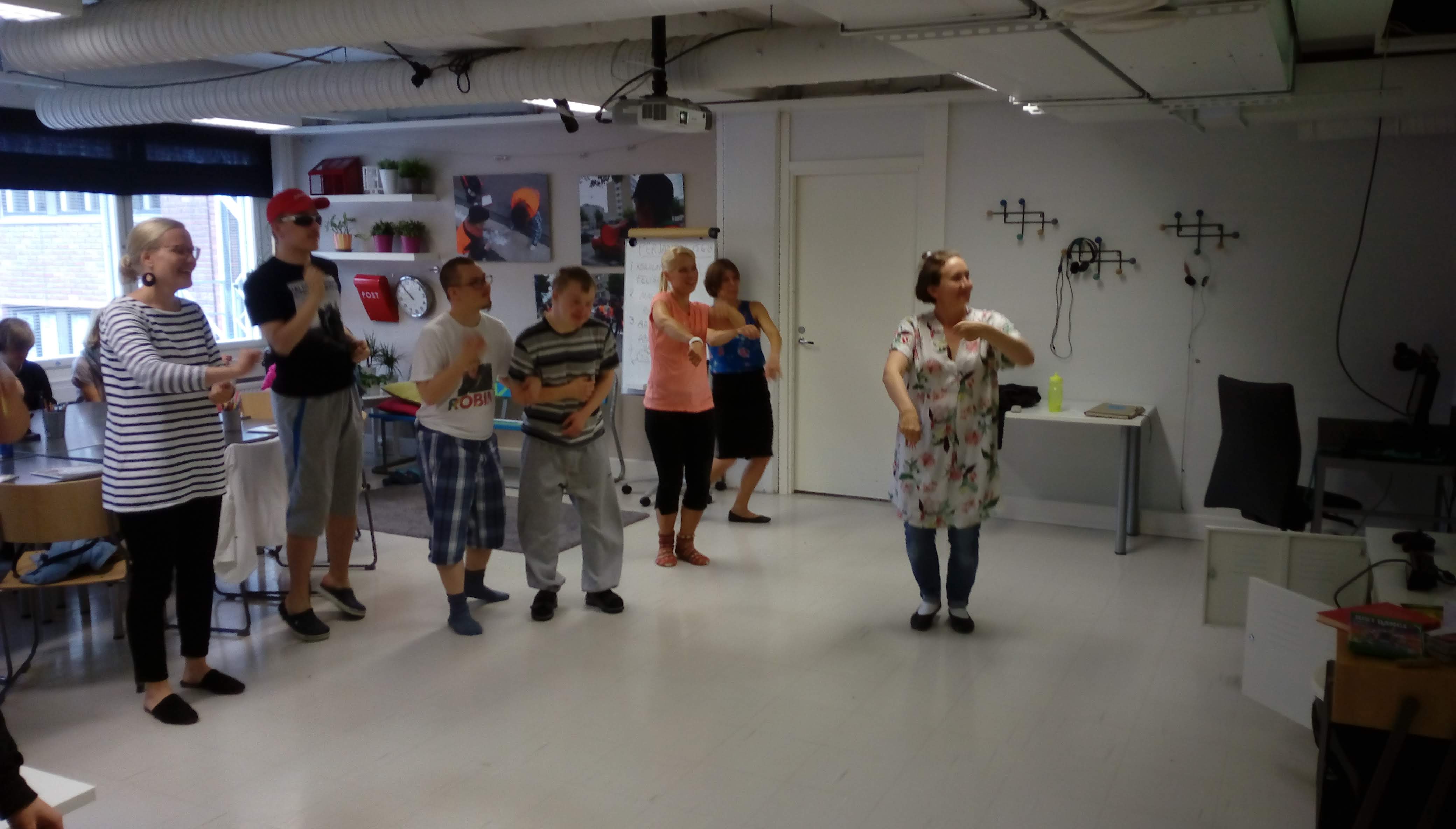
Studying the involvement of people with disabilities in the management of the organization
Summary report of the 2nd study tour
Name of participant: Gábor Palkó Dr., lawyer, expert by experience
Host organization name: KVPS
Location of the Study Tour: Tampere (Finland)
Date: 10-16 June 2018
From June 10 to June 16, 2018, I participated in a study tour organized by Hand in Hand Foundation in Tampere, Finland, where the staff members of KVPS (Kehitysvammaisten Palvelusäätiö) hosted us. KVPS is a foundation in Finland that specializes in offering special services to people with intellectual disabilities (e.g. supported housing), continuously improving these services.
During the study trip we studied the foundation and the practices of the foundation and its partner organizations. As a person with disabilities and as a lawyer, it was particularly important for me to see the good examples in Finland and the legal solutions that made it possible.
The legal system of Finland resembles the Hungarian legal system in the main elements of the legal institutions that are based on the Roman law. They both contain the concept of legal ability and capacity to act in the same way and with the same content and also the related restrictive measures. It is an important difference that their system of guardianship treats the status of inalienable rights differently. It is a fundamental principle in both legal systems that the exercise of certain rights cannot be delegated to others, such as the political rights. In Hungary a person under restricted guardianship cannot exercise these rights. In Finland, the restriction of the capacity to act does not affect those rights.
KVSP's affiliates (Incluson Finland, Aspa, NEO-OmaPolku, Tukena) provide access to supported housing to a large number of people with disabilities, which seems to me to be one of the most important activities of the foundation. In Finland, the system of public funding of this activity - the redistribution of gambling revenues - also provides the Foundation with the necessary financial resources. The Foundation also employs a number of people with disabilities, so I do not think the expertise is missing from the Foundation's work either.
During the study trip, I have been able to look at the situation in Finland on the "field", among which I would like to highlight the day-care centre in the city of Nokia, where people with disabilities can perform value-creating work at the same time as they receive the necessary development services.
To summarize, I can say that the study trip was instructive for me, as it allowed me, a lawyer not working in the social sector, to take a glimpse into the practice and legal system of another country. What I have seen and experienced, in my opinion, has become an integral part of my thinking on the subject, and I am confident that I will use these experiences later on. I also believe that the examples, solutions and the legal environment in Finland can be fully adapted in the local level, in the work of Hand in Hand Foundation (e.g. working together with people with disabilities and their further involvement in the decision-making process) and at national level (e.g. the dissemination of the legal institution of supported decision-making or the revision of the restrictions of the capacity to act). In my view, the adaptation of these good practices would be beneficial to both the Foundation and Hungary, and ultimately to all people with disabilities.



Study on the involvement of the persons concerned – people with disabilities in the management of the organisation
Name of participant: MiklósFehér
Name of the host organisation: KVPS-KehitysvammaistenPalvelusaatio-Tampere;
Location of the study trip: Tampere, Finland
Duration of the study trip: 09. 09. 2018 – 15. 09. 2018
Area / organisational unit subject to the examination:10. Sept. – Inclusion Finland KVTL; 11.Sept. - NEO OmaPolku; 12. Sept. – Daycare centre ASPA, KVPS; 13. Sept. - Nuutisara-Day Center, KVPS; 14. Sept. - KVPS
As the great majority of the organisations visited provide services to clients with intellectual disabilities, the experience gathered tend to be applicable to them, too.
Inclusion Finland KVTL supports people with disabilities and their families in the field ofinclusion and quality of life.They have 180 associate organisations with 17,000 members.It was founded by the parents of people with intellectual disabilities, therefore the management, which is elected according to the regulation of the board of trustees, has been comprised of people concerned from the very beginning.They elect the members of the Board at their annual meetings held for all member organisations, one of whom is always a person with intellectual disability.They apply for the position voluntarily when it is announced.Election is always followed by a short preparation (1 day) and the member with disability is always accompanied by an assistant.The Board has 4-5 meetings a year, each of which lasts for a whole weekend.
NEO-OmaPolku: They sit down and discuss the weekly program with every client on Mondays.They ask the participants at this meeting once a year if they want to be involved in the work of the youth council, and everyone signalling their intention can participate.The mandate ends when the member no longer feels like participating in the council.There are five members at the moment, because five of those concerned applied to participate.The professionals are usually presented a written proposal.Participants are also encouraged to make critical comments, the importance of which, as well as issues like the meaning of decision-making, the freedom of decision, etc. are explained before the council is formed.They can attend nation-wide elections (some with assistants), which they are again prepared for.There is an assistant present at every meeting, who prepares a memorandum acting as a secretary, facilitates communication and presents the topic.Assistants participate at the moment as volunteers in the work of the council, but they may get some payment for this work in the future.
Selection at ASPA takes place based on application and the experts’ recommendations.
At KVPS, the council facilitating the operation of the organisation and comprised of people concerned has been working together for a long time, and now new applicant has signalled an intention o participate.The council is comprised of 8 persons at the moment.Basically, members are added to the council based on voluntary application.The members of the board of trustees living with disabilities have also been members of the council for a long time.
As for their inclusion in various activities, people with disabilities also form a separate council at Inclusion Finland KVTL.The members meet the head of communications every second month to discuss what is good and what is not good in the communication of the organisation.This opinion is then presented to the management by the member of the board of trustees.The members (which is the term used to refer to people with disabilities as well rather than clients!) are informed before the introduction of every new activity.
At NEO-OmaPolku, the opinion of those concerned is basically heard before any action or decision related to the representation of their interests.This takes place in the youth council, which is primarily comprised of people concerned.There is always a professional attending the meetings to facilitate the process.The questionnaire for the clients is developed with the professionals jointly and answered by the clients.They signalled for example that there was too much noise in the canteen and various measures were taken after that to reduce the noise.They hold meetings on a monthly basis.At the moment, they are preparing for the visit of a Member of the Parliament.The procedure for entering the institution used to contain some mandatory elements and not allow any choice.Newcomers were informed in detail of why this was necessary.Nowadays, the process is not the same for everyone; they don’t need to fill in everything and they have time to do it.ASPA:Peer review:the selected persons with disabilities interview those living in residential homes or assisted living as to what they are or aren’t happy with and their suggestions for the improvement of the services.Residents have been found to be more willing to tell their problems to them.There 2-4 meetings held within the organisation for general planning purposes, where half of the attendees are living with disabilities.
5 of the 7 members of the board of trustees of KVPS are parents, one of whom is living with disabilities.Similarly to the members of the above-mentioned Council, they are free to give their opinion regarding the activities of the organisation and make suggestions for modifications and innovations.They receive different kinds of assistance with communication.The opinion of those concerned is sought before every new event or service, and not only through the Council.The development department meets about 1000 persons with disabilities every year.The council comprised of 9 members tries to collect the opinion of the others.They hold four meetings a year anyway.Their latest topic was: how to say no to an invitation to a date if you don’t want to go.They are very proud of their membership and they are also awarded for it.They have many professionals who are good at the various communication techniques.The representative who is also a member of the Board is in the most difficult situation.Feedback and evaluation are very important for the sponsors of the organisation, therefore they pay particular attention to involving those using the service.
The member participates at a 1 day long preparation after his/her election at Inclusion Finland KVTL, where he/she learns about the task of the Board of Trustees, how he/she contribute to it, what assistance to use, how to communicate, etc.At NEO-OmaPolku, members are prepared individually.It is explained before the setting up of the council why this is important, and what decision-making or the freedom of choice mean.At ASPA, those concerned attend a two-day long training before starting their activity.At KVPS, those concerned receive many kinds of preparation before starting their activity.The most important thing is for them to become aware of their freedom of choice, i.e. their right and opportunity to choose.This also includes becoming familiar with their own situation, i.e. that participants have a realistic view of themselves.They usually work in groups, because group effect is important.They also work individually with those in a very difficult situation.They try to help them to be ambitious and formulate their plans and desires.
Assistance provided to those concerned during their activity: at Inclusion Finland KVTL, there is a personal assistant helping the client at the meetings with interpreting what is said and communicating what the member with disability would like to say.Permanent personal assistance is possible at NEO-OmaPolku, too.The members of the youth council are free to formulate their opinion and also facilitate communication, if necessary, e.g. by using pictures.It is also possible to make decisions individually.At ASPA, there are 3 professionals assisting the work of those concerned at the moment, who accompany them to residential homes, write down the answers, etc.At KVPS, there is an expert familiar with various communication techniques attending the meetings of the council and the board of trustees to facilitate the communication and understanding of those concerned.
At Inclusion Finland KVTL, Board members receive free personal assistance, as well as a reimbursement of their costs.At NEO-OmaPolku, assistants participate at the moment as volunteers in the work of the council, but they may get some payment for this work in the future.At ASPA, they get regular salary for their activity, which they perform based on employment contract.Participants receive payment for their activity at KVPS, too.
Cooperation between the employing organisation and the organisation providing mentoring services: the major forms of employment at Inclusion Finland KVTL are institutional employment and community employment (with thousands of persons working in these forms), compared to an insignificant number of, namely about 300, persons with disabilities working on the open labour market.In the case of institutional employment, the professional providing mentoring is obviously continuously present.Workers employed in the form of community employment work for a company on the open labour market, but sign no employment contract with the employer, which establishes a legal relationship with the delegating organisation instead.Mentoring is available and the company is continuously in contact with the organisation providing mentoring services.However, the mentor is not present all times, i.e. the employee works after a certain time individually.Assisted Employment does exist on the open labour market, where mentoring is also available, but this form of employment is not significant.At NEO-OmaPolku, there are 6 clients working on the open labour market, each of whom are mentored personally.The interests of the employees are represented by Vates Foundation, which mediates between employers and employees.Their activities include:sensitization and public opinion shaping events, informational meetings.At Nuutisara, clients are assessed by an expert, who also provides mentoring on the open labour market and prepares employers – the other professionals work in the field of sheltered employment.Our host, Mika would be happy to be provided an assistant.They have 15 clients in total who work on the open labour market.
Mentoring/coaching services provided in connection with employment:at Inclusion Finland KVTL, they train advocates from those concerned to visit employers in order to tell them about the situation, desires and needs of people with disabilities.The services of Assisted Employment (the assessment of abilities and needs, preparation for employment, searching for specific jobs, staffing services, facilitating integration) are available at the organisation.The service is financed by the local higher-level government (but lower than county-level).At NEO-OmaPolku, workplace integration is facilitated with personal mentoring, which is available first for a whole week, then only less frequently.Some people are visited only on 2-3 occasions at their workplaces.
At Nuutisara (which is a daycare centre and sheltered workplace), every client has a personal mentor, who prepares them for the work individually.During this preparation, clients participate at job sampling and professionals decide which direction the employment should continue in after that.Instead of any standardized measurement tools, observation plays a decisive role.
In Finland, every person is eligible for a personal assistance at work.
As for the service provided to the client, there is a difference between employment within and outside the institution.There is no difference between the two types of employment outside the institution (community employment or employment on the open labour market based on employment contract), as personal mentoring is available in both cases, but work is usually performed without it.The presence of the professionals is continuous in the case of employment within the institution.If somebody is transferred to the open labour market, but his/her employment is terminated for some reason, they take him/her back to the employment centre.
The mentoring service is free (financed by the local government), the persons concerned can use personal assistants within a certain time frame, and can use this service during their work as well.Clients got into contact with the organisation earlier, they usually step out to the open labour market from sheltered employment, but, as mentioned before, this usually takes the form of community employment not realized based on an employment contract.In certain cases they also advertise their services in the media.
The emphasis is basically on preparing the individual in a less formalized form.The highest priority is to learn as much as possible about the desires and opinion of those concerned.
As for the best practices, I have not yet encountered the advocacy service in this form in Hungary.It is important, that in the case of institutional employment, the work-like activities are supervised by professionals who are primarily experts of the given field.For example, the media workshop producing films is led by a professional from the film industry, who acquired his degree in social studies only subsequently.
The Ambassador of Friendship is Petri, a 43 year-old young man with intellectual disability and autism. He was invited by one of his friends to his residential home, where Petri met someone who couldn’t speak.Petri realized that if he sits down next to and starts speaking to that person, he can help him using his own experience; this is what the program was rooted in.It was then that they organized for him to visit residential homes by bike after proper preparation and with continuous attendance.The idea really came from Petri!He even completed an evening course in the field and now he is training new ambassadors, the number of whom has already reached nine.He works 15 hours a week based on employment contract and his travelling costs are also reimbursed.His current contract expires next year, when the project finishes.He is accompanied by his parents on longer travels.Petri is a member of an expert group in the organisation, which holds 4-5 meetings a year to discuss new projects.
Examining the employment possibilities of people with disabilities we found that sheltered employment providers basically cooperate closely with organisations providing housing services and therapy and employment is part of the portfolio of services in most of the cases.Community employment takes place at market players of the open market, where, again, no employment contract is concluded with the participants and it is the delegating organisation and the employer who establish a legal relationship with each other.The person working receives minimal payment, EUR 12 a day, which qualifies as social care.This may continue for years. Professionals try to direct the process towards regular employment, however, employers are not interested in it (they would then receive no subsidy for employing the person with disability), as community employment actually provides them with labour force free of charge.The professional called this “Finnish slavery”.Workers with disabilities are basically employed on the open labour market for PR reasons.Even though employers receive some subsidy for employing disadvantaged employees, but it is people with disabilities who are taken into consideration as last within this group.The relatively high rate of unemployment in Finland does not facilitate the employment of people with disabilities, either.In fear from the risks involved, the relatives of those concerned often do not favour employment on the open labour market, either.Employers on the open labour market do not create jobs for persons with disabilities specifically.They pay an average hourly wage of EUR 10.There are several organisations working at the moment on increasing the number of employees with intellectual disabilities on the open labour market, which they try to achieve by raising the awareness of employers primarily.At the same time, there is a wide range of opportunities available in the field of sheltered employment: they consult the client about the ideal job through various channels of assisted communication.
As for the regulation: a person wishing to work on the open labour market has a high chance of losing the quite high amount of social benefit:this happens when the amount of the salary exceeds EUR 730, while the average salary in Finland is somewhere above EUR 3,000.For example, the persons with disabilities working at KVPS work only 6 hours a day on 2 days only in a week, so as not to exceed the threshold of EUR 730 and lose their pension, which may amount even to EUR 1,500 - 2,000 including other benefits!
In comparison, the salary limit in Hungary is more than HUF 200,000 at the moment, with the average salary being only HUF 40,000 higher than this amount.
As for the representation of the interests of employees with disabilities: every organisation working with people with disabilities attend the Disability Forum, where the various problems formulated by the clients are discussed as well, including those related to employment.Traditional trade unions hardly have any members with disabilities and some of them do not admit any persons with intellectual disabilities.
Name of participant:Tibor Gyergyádes
The selection of the persons concerned for being involved in the activities is realized within the organisations as follows: the client and his/her social assistant agree to apply.This is followed by job sampling, where the applicant can try various activities.Having observed the job sampling process, the head of the institution decides which department the applicant could be admitted to, if any.There is no written entrance test, the team members are consulted before the decision.There are several departments in the institution, where clients are admitted based on their abilities.These departments include the joiner shop, the sewing and weaving department, the packaging and commissioning department or garden work.
Everyone receives accident prevention information and training as part of the preparation, and the work processes are imparted in a tailor-made manner.Everyone works at their own tempo, which does not seem to have any significance.They can work in groups and individually, too.The persons concerned are certainly provided workwear, work equipment and tools, as well as professional supervision and guidance.Work constitutes only a part of the daily program; they also plan together other, e.g. leisure time activities.
About 50% of the clients work based on an employment contract and get a salary for their work, whereas the other 50% of the clients perform their activities as community work; they are paid a daily allowance, which is more or less sufficient to finance their meals.
In the day-care centre (ASPA), the clients and the mentor are in daily contact with each other, and 2 of their clients work at the moment on the open labour market based on employment contracts.Mika is the mentor, who keeps contacts with clients and employers.
At NEO OmaPolku, there are two coaches working, who perform individual case work with the clients.Their services indirectly help clients to be able to live fuller lives.The media studio is run as a “small business” and the revenues it generates on the market are received by its disabled members of staff.There is no other form of mentoring and encouragement which would be more effective than this, provided that it is realized under transparent conditions.
The mentor is present throughout the working hours during the first week of employment, then less and less frequently, on only 2-3 occasions a year, but this is also the case with those who are already experienced.They work with 12 mentors altogether.
There is no difference between mentoring services provided on the open labour market and in sheltered employment.Clients returning from their workplaces on the open labour market and joining one of the employment groups receive the same support from mentors as before.
The issue of illegal employment is a major problem in Finland too, and it was mentioned several times.No more than 2-3% of the persons with intellectual disabilities but able to work are employed in an official framework, and the situation does not seem easy to resolve.The organisation NEO OmaPolku offers its services free of charge to its clients.They are financed mainly by the government, by means of the reallocation of gambling tax.They inform the public about their services through various channels; there is limit as to the number of persons admitted, but it is handled flexibly.In addition to mentoring (coaching) services, there are several other services and practices worth mentioning as well: Taxi Tampere helps with the transportation of people with physical disabilities free of charge with properly equipped vehicles.The ShortBreak service of KVPS is also remarkable, even though it is not expressly mentoring: it is a model similar to Fecske service in Hungary, which helps families raising children with disabilities.The clients of KVPS can request personal assistance in 30 hours a month.We could also meet a personal assistant who was waiting for Milla, the staff member of ASPA, at the train station so that they would travel to Helsinki together.The “fellow professionals” of KVPS are prepared for providing assistance to their fellows at a two days long training.
ASPA has staff members with disabilities who mentor their fellows in a professional framework, according to work schedule, for a salary.The play an important role because the appropriate level of a supportive relationship is easier to establish with them.
From the best practices seen in the field of mentoring services, the efficient allocation of the tasks was the most apparent.In some of the organisations we met every colleague was good at everything, whereas in others the coach was in charge of coaching and the care-taker was in charge of care only.This is a very positive example, as the knowledge of the professional dealing with a given client having the time and energy to pay attention to him/her exclusively during the given time can be very comforting.
We also examined the employment opportunities of the persons concerned.Unemployment is a significant problem in Finland.The employment of people with disabilities on the open labour market is a field which has not really been exploited until now.There are two major obstacles: 1. wage limit:Disabled persons in receipt of state benefits can earn a wage not exceeding EUR 730; 2. the companies have not yet discovered the opportunities inherent in or do not acknowledge the relevance of employing people with disabilities.Another, indirect reason arising with organisations supporting people with disabilities may be the difficulty of the transition to such form of employment.Financial stability and security are fundamental characteristics: people with disabilities receive sufficient benefits from the state to finance their living, i.e. they do not need to establish employment.However, if they still would like to, they can do it for a relatively low wage.The organisations supporting people with disabilities are collecting signatures to put forward a proposal for the amendment of the Act on the wage limit.The chances of and the opportunities for finding employment on the open labour market are quite insignificant because of the factors listed, meaning no more than a few hundreds of persons working there on a national level.(Our information pertains primarily to employees with learning disabilities.)“Sheltered” employment is the widespread form of employment, with local governments, NGO-s and the private sector equally playing a role in it.
The culture of making decisions jointly on daily issues can be observed with any organisation.The persons concerned, i.e. the clients using the services can be in contact with various levels of advocacy.Inclusion employs two lawyers representing the interests of people with disabilities on all legal levels.The dark side of this is that illegal employment also exists, which is seen as a necessary evil by the participants, therefore the interest groups cannot change it, as long as those concerned ask for it.Assisted decision-making in the form known in Hungary is not applied in Finland; the decision is up to the persons concerned, but their choices are quite narrow, and almost everything is regulated by legal rules.With its board members being persons with disabilities or their parents,the decision-making culture mentioned above is obviously present at KVPS.
